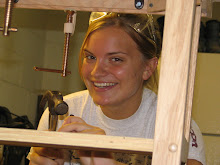This year is designed to be one of intentionality and simplicity. One area that we are urged to focus on, and I feel we are called as Christians to challenge ourselves in, is household economics. Particularly interesting to me as a former Economics major, I feel especially called to think about what it looks like to live more intentionally as a consumer.
Right now in vocational discernment, our group of Young Adult Volunteers in Nashville are reading a book titled Practicing Our Faith: A Way of Life for a Seraching People, by Dorthy C. Bass. The first chapter out of this book we chose to discuss was a chapter on household economics. This chapter challenged the reader to think about the economic implications of "God with us". I found this chapter fascinating as it addressed how our economic system affects the lives of all people, and the practice of simplicity as a voluntary orientation towards life we should strive for, and how that is different than poverty which is involuntary and debilitating.
When thinking of living simply as a YAV, I am also drawn to thinking about the people we are in mission with, many of whom struggle economically. As a policy, Siloam (the clinic I serve at) never refuses service to anyone if they can not pay. We offer a sliding fee scale based on household income to lessen the cost for the needy, and do not send out bills or collectors to patients who fail to pay. As a result we have many patients with very high balances. However we have many more patients who always pay for their visit and never develop an outstanding balance. Last week when checking patients out at the front desk, one gentleman who qualified for our lowest income bracket (meaning he only paid $5 plus the cost of labs for doctors visits) wrote a check for $5o to pay for his $11 visit. I could see in the computer that he consistently paid the correct amount for his visits each time he came, but this time he told me that he had the money and he would like to give us more because of all that we have done for him. Extremely moved, I thanked him and told him it was donations like his that allowed us to help those who can not pay. A few hours later another patient checking out said she did not have any money that day to give us for her visit. Although I told her that it was no problem, she dug around in her purse and came up with a single crinkled dollar bill and asked if she could at least pay that. Being exposed to economic transactions like these make me think about how we spend our money. It really is true that people will spend their money on what is most important to them. This made me think about my own finances and question how much I really think about every dollar I spend, and how often I take for granted not having to count every one of those dollars.
This Lenten season I have decided to give up credit/debit cards and will be paying for everything with cash. As someone who almost never carries cash, this will be a great experience for me to plan ahead about what I am budgeting my money for, and take more time to think about where and on what I am spending my money. For example, paying for $90 dollars of groceries with cash feels a lot different that simply swiping a card. I also want to be more intentional about where I am purchasing food and other goods from, and trying to reduce waste. These questions are ones that I frequently neglect to ask, so I know this will be a very challenging practice. I am excited to have this experience of intentionality and time to reflect on some of those more difficult questions.
Sunday, February 21, 2010
Subscribe to:
Comments (Atom)
